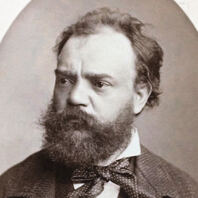Antonín Dvořák
Composer
Few composers had such a happy relationship between talent and success, and recognition at home and abroad, as Antonín Dvořák. Together with Bedřich Smetana, who was 17 years older, Dvořák helped Czech music to achieve international recognition.
However, the road to success was initially difficult: Dvořák was practically unknown as a composer until he reached his forties. But the son of a butcher had no doubts about his vocation. Instead, he wrote numerous works that were not performed. He earned a modest living as an orchestral violist, playing under the direction of his idols Franz Liszt and Richard Wagner. Dvořák’s breakthrough was helped by famous patrons and the folk music of his homeland: Johannes Brahms recommended the publication of Dvořák’s Moravian Duets to his publisher Fritz Simrock. The Slavonic Dances then proved to be a real bestseller. The patron Brahms became a lifelong friend. But Dvořák enjoyed fame not only as a composer – he was also in great demand as a conductor. He appeared with the Berliner Philharmoniker in 1884 and 1899, performing his own works. In addition, he undertook several trips to England, during which he frequently received commissions for compositions – among others, his Seventh Symphony and Requiem were written in this way. Dvořák moved even further away from his Bohemian homeland in 1892 when the National Conservatory of Music in New York appointed him director. Despite his persistent homesickness – or precisely because of it – he composed here, among other things, two of his most famous works today: the Cello Concerto and the Ninth Symphony “From the New World”. Returning from America, Dvořák turned to symphonic poems. Dark fairy-tale sources in particular inspired him to write miniature instrumental dramas. And Dvořák’s music, which shifts between seriousness and folkloric playfulness, is also effective on the big stage: his mermaid opera Rusalka continues to delight audiences to this day.